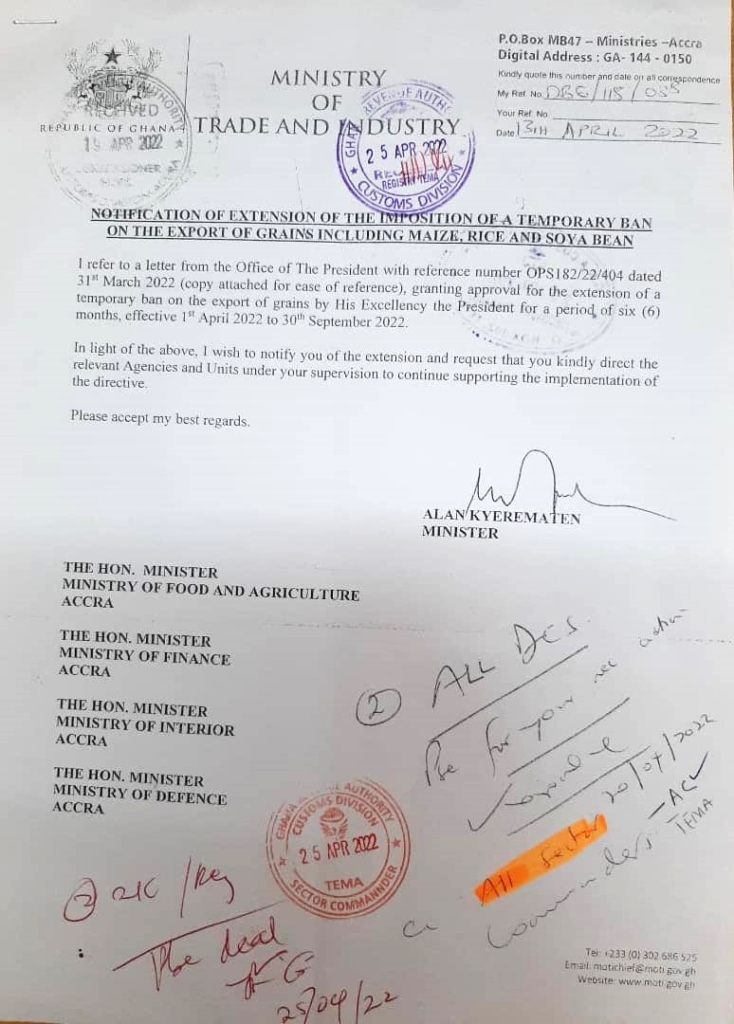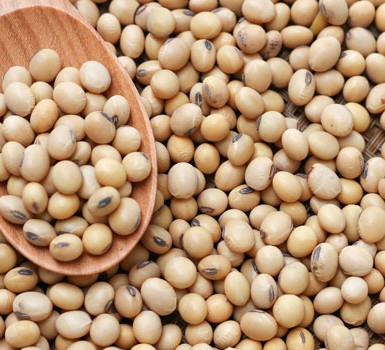The Ministry of Trade and Industry has extended a ban on exportation of soya bean and other grains such as maize, and rice for the next six-months.
This comes after a JoyNews Hotline Documentary titled “THE BROKEN CHAIN” which shed light on the soya bean value chain, the challenges therein and impact on the poultry industry.
The one-hour documentary produced by Prince Appiah revealed more than 80 percent of soya bean processing factories have shut down because of non-available raw materials.
Some poultry farmers have also sold their birds to be able to stay afloat in the business.
The Ghana National Poultry Farmers Association, for instance, has had to release new prices of egg, with 30 percent increase after the Ramadan fasting.
The letter dated April 13, 2022 by the Ministry of Trade and Industry copied to the Ministry of Food and Agriculture, Ministry of Finance, Ministry of Interior and the Ministry of Defence, puts a temporary ban on the exportation of the crop together with maize and rice.
It directs the relevant agencies and units under their supervision to support the implementation of the directive.

These crops are currently in short supply in the country impacting the various value chain drivers and industry.
Chairman of the Soya Value Chain Association of Ghana, Thomas Wabi Bello, says though they acknowledge the suspension, they believe more needs to be done.
“We acknowledge the suspension of the exportation of the soya for six-months, but it is not good enough because the Indians and other nationals will not stop buying. If they know it is six months and they can buy and hoard and wait for six-months and export, the problem will persist,” he said.
The Association has therefore suggested a two-year ban.
“We suggest there is a long-term suspension for at least two years. That will deter anyone going to buy from hoarding and exporting.
“We thank the President for his efforts but we need more; at least a two-year ban”.
Mr. Bello says in the future, these foreigners should be banned from going straight to the farms.
“If they want to buy, they should go to the Ghana Exchange Commodities and buy from them. We need to have a proper syndication for buying these beans for stocking and export, it is very important,” he stated.
Latest Stories
-
I was sure 2 months ago I’d get married, but not anymore – Reekado Banks
31 minutes -
I’m getting old, need to start having children – Burna Boy
43 minutes -
Diddy trial is ‘most expensive prostitution trial in American history’ – Expert
55 minutes -
Court dismisses Mohbad’s father’s suit against Naira Marley, Sam Larry
1 hour -
‘This is not me’ – 2Baba apologises to wife Natasha, children over controversial comments
1 hour -
Diddy’s reputation is tarnished, but could he find a way back?
2 hours -
US to face holders Mexico in Gold Cup finals
2 hours -
Spain begin Euro 2025 campaign by thrashing Portugal
2 hours -
Dortmund confirm Chelsea deal agreed for Gittens
2 hours -
Sinner continues seamless start to Wimbledon bid
2 hours -
‘One of toughest losses’ – Draper exits Wimbledon early again
3 hours -
Djokovic outclasses Evans to continue Wimbledon bid
3 hours -
Commercial use of tricycles still illegal – Judge reminds operators
3 hours -
Security guard jailed for stealing €5,600 from NHIS Head Office
3 hours -
Ho Teaching Hospital charts path to medical excellence and tourism under new leadership
5 hours

